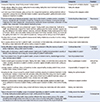Abstract
Purpose
This study was to explore experiences of spouses with hematologic malignancy patients. The main question was "What are experiences of spouses whose husband or wife was diagnosed with hematologic malignancy?".
Methods
Participants for this study were 12 spouses. Data were collected through individual in-depth unstructured interviews with participants from Feb, 2014 to June, 2015 and analyzed using Strauss and Corbin's grounded theory methodology
Results
A core category was 'Finding a way to get out of the endless tunnel'. The process is 1) Shock, 2) Confusion, 3) Struggle, 4) Living with the disease, 5) Maturation within the disease. The contextual conditions were 'Responsibility for patient', 'Fear of spouseless future'. The intervening conditions were 'Having support', 'Having closer marital relationship', Keeping patient's disease repressed. Finally, Participants reached 'Circling around the disease', 'Finding personal growth'.
Figures and Tables
Table 1
Concepts, Categories and Paradigms of Spouse's Experiences of Hematologic Malignancy Patients

References
1. Hall A, Lynagh M, Bryant J, Sanson-Fisher R. Supportive care needs of hematological cancer survivors: a critical review of the literature. Crit Rev Oncol Hematol. 2013; 88:102–116.

2. The Korean Society of Hematology. Hematology. 2nd ed. Seoul: Bubmoon education;2011.
3. Oechsle K, Aslan Z, Suesse Y, Jensen W, Bokemeyer C, de Wit M. Multimodal exercise training during myeloablative chemotherapy: a prospective randomized pilot trial. Support Care Cancer. 2014; 22(1):63–69.

4. Annual report of cancer statistics in Korea in 2012. Accessed May 17, 2015. http://ncc.re.kr.
5. Jung KW, Won YJ, Kong HJ, Oh CM, Cho HS, Lee DH, et al. Cancer Statistics in Korea: incidence, mortality, survival, and prevalence in 2012. Cancer Res Treat. 2015; 47(2):127–141.

6. Manne S. Cancer in the Marital Context: a review of the literature. Cancer Invest. 1998; 16(3):188–202.
7. Clark PG, Rochon E, Brethwaite D, Edmiston KK. Screening for psychological and physical distress in a cancer inpatient treatment setting: a pilot study. Psychooncology. 2011; 20(6):664–668.

8. Kim Y, Given BA. Quality of life of family caregivers of cancer survivors: across the trajectory of the illness. Cancer. 2008; 112:11 suppl. 2556–2568.

9. Li Q, Loke AY. The positive aspects of caregiving for cancer patients: a critical review of the literature and directions for future research. Psychooncology. 2013; 22(11):2399–2407.

10. Choi ES, Kim KS. Experiences of family caregivers of patients with terminal cancer. J Korean Acad Nurs. 2012; 42(2):280–290.

11. Kwon EJ, Yi MS. Husbands' caring experiences for women with breast cancer in Korea. Asian Oncol Nurs. 2013; 13(1):18–27.

12. Papastavrou E, Charalambous A, Tsangari H, Karayiannis G. The burdensome and depressive experience of caring: what cancer, schizophrenia, and alzheimer's disease caregivers have in common. Cancer Nurs. 2012; 35(3):187–194.
13. Williams AL, Bakitas M. Cancer family caregivers: a new direction for interventions. J Palliat Med. 2012; 15(7):775–783.

14. Romito F, Goldzweig G, Cormio C, Hagedoorn M, Andersen BL. Informal caregiving for cancer patients. Cancer. 2013; 119:Suppl 11. 2160–2169.

15. Northouse LL, Katapodi MC, Song L, Zhang L, Mood DW. Interventions with family caregivers of cancer patients: meta-analysis of randomized trials. CA Cancer J Clin. 2010; 60(5):317–339.

16. Fletcher BS, Miaskowski C, Given B, Schumacher K. The cancer family caregiving experience: an updated and expanded conceptual model. Eur J Oncol Nurs. 2012; 16(4):387–398.

17. Strauss A, Corbin J. Basics of qualitative research. Grounded theory and techniques. 2nd ed. CA: Sage;1998.
18. Holtslander LF, Duggleby WD. The hope experience of older bereaved women who cared for a spouse with terminal cancer. Qual Health Res. 2009; 19(3):388–400.

19. Li QP, Mak YW, Loke AY. Spouses' experience of caregiving for cancer patients: a literature review. Int Nurs Rev. 2013; 60(2):178–187.

20. Houldin AD. A qualitative study of caregivers' experiences with newly diagnosed advanced colorectal cancer. Oncol Nurs Forum. 2007; 34(2):323–330.

21. Sercekus P, Besen DB, Gunusen NP, Edeer AD. Experiences of family caregivers of cancer patients receiving chemotherapy. Asian Pac J Cancer Prev. 2014; 15(12):5063–5069.

22. Lopez V, Copp G, Molassiotis A. Male caregivers of patients with breast and gynecologic cancer: experiences from caring for their spouses and partners. Cancer Nurs. 2012; 35(6):402–410.
23. Janze A, Henriksson A. Preparing for palliative caregiving as a transition in the awareness of death: family carer experiences. Int J Palliat Nurs. 2014; 20(10):494–501.

25. Kim Y, Schulz R, Carver CS. Benefit-finding in the cancer caregiving experience. Psychosom Med. 2007; 69(3):283–291.




 PDF
PDF ePub
ePub Citation
Citation Print
Print



 XML Download
XML Download